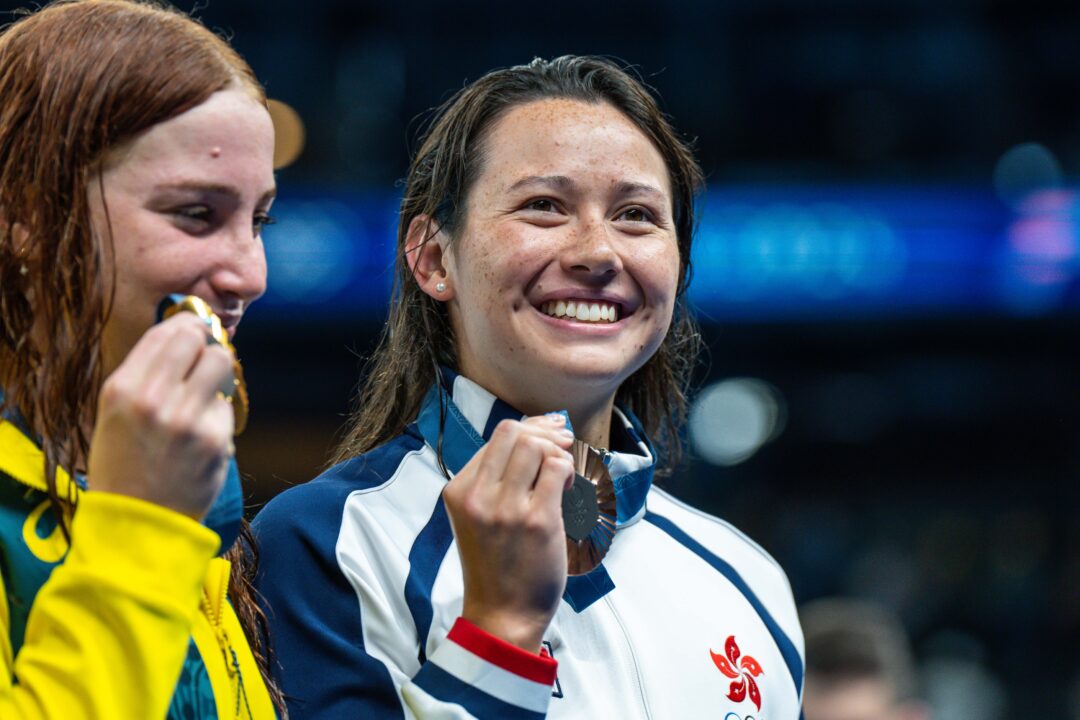2024 PARIS SUMMER OLYMPIC GAMES
- Pool Swimming: July 27 – August 4, 2024
- Open Water Swimming: August 8 – 9, 2024
- La Défense Arena — Paris, France
- LCM (50 meters)
- Meet Central
- Full Swimming Schedule
- SwimSwam Preview Index
- Pick ’em Contest
- How To Watch
- Entry Lists
- Live Results
- Prelims Live Recaps: Day 1 | Day 2 | Day 3
- Finals Live Recaps: Day 1 | Day 2 | Day 3
Siobhan Haughey earned about $192,000 U.S. dollars from the Hong Kong Sports Institute for winning an Olympic bronze medal in the women’s 200 freestyle (1:54.55) behind the Australian duo of Ariarne Titmus (1:53.81) and Mollie O’Callaghan (1:53.27) in Paris on Saturday.
The podium appearance pushes Haughey’s career Olympic earnings past $836,000 USD as the 26-year-old also picked up a pair of silver medals in Tokyo that were worth $322,000 apiece. Hong Kong is the most generous nation in terms of Olympic prize money this summer, with its $769,000 incentive for gold outpacing Singapore’s $744,000 award.
By comparison, O’Callaghan collected just $20,000 for her victory and Titmus $15,000 for her runner-up finish. The International Olympic Committee (IOC) doesn’t award prize money to winners, leaving that up to individual countries themselves.
Haughey wasn’t even the biggest winner on Monday. That honor belonged to men’s 100 backstroke champion Thomas Ceccon, who will receive a $196,000 payout from Italy after holding off China’s Xu Jiayu (52.32) and American veteran Ryan Murphy (52.39) with a winning time of 52.00. Ceccon is the second Italian to triumph so far this meet after Nicolo Martinenghi took the men’s 100 breast title on Sunday.
Murphy was one of four American medalists during the third finals session, bringing home $15,000 for his 3rd-place finish. In the women’s 400 IM, Katie Grimes (4:33.40) and Emma Weyant (4:34.93) will receive $22,500 and $15,000, respectively, for claiming silver and bronze behind Canadian champion Summer McIntosh (4:27.71). Canada has the same payout system as Australia: $20,000 for gold, $15,000 for silver, and $10,000 for bronze. Luke Hobson snagged another bronze for the U.S. in the men’s 200 free (1:44.79) worth $15,000.
Tatjana Smith earned $400,000 South African Rand for her women’s 100 breaststroke win (1:05.28), equal to about $21,000 USD.
Some countries offer more than just money as their Olympic prizes. Kazakhstan give three-room apartments to gold medalists, two-room apartments to silver medalists, and one-room apartments to bronze medalists. After the Tokyo Olympics in 2021, Indonesia offered its gold medalist badminton athletes five cows, a meatball restaurant, and a new house on top of a cash prize worth $350,000.
There is a growing debate surrounding whether the IOC should directly compensate medalists instead of reinvesting money in other areas of the Olympic movement. During the last Olympic cycle, the IOC raked in more than $7.6 billion in revenue. In April, World Athletics became the first sports federation to unveil monetary rewards for Olympic winners with its $50,000 incentive for gold in all 48 track and field events this summer.
“It’s crazy money, big business,” men’s 200 free silver medalist Matt Richards told the Guardian in April. “When you look at that, you go: ‘Well, it makes a lot of money, but then the athletes aren’t actually going to be able to win any of that.’ If the IOC steps up and says, ‘We’ll just put a blanket amount, this is how much the medals are worth across all sports,’ that would make a lot of athletes a lot happier.”

Zero pounds for Matt Richard’s silver. Team GB swimmers receive nothing for a medal of any colour.
And people think Olympic medalists automatically earn fantastic money. All depends on the country.
I think the IOC should just give 3 meatball restaurants to the Gold Medalists, 2 meatball restaurants to Silver, and 1 to Bronze. The already crazy competition at each Olympics would easily skyrocket to new heights!
That would lower the value of meatball restaurants- and nobody wants that
Wow, $769k for a gold in Hong Kong. That’s some serious incentive!
Sure would be nice if the US put some real money up for grabs
yep, I bet it makes a big difference for some when deciding to retire or not too. a $500k medal award could be the difference between 4 more years of Dressel + Murphy or not
Is 40k per gold medal not “real money”?
4 years of hard work getting minimum wage from the government to maybe win $40k is not “real money”, correct
Compared to what? $40k for how many years of work?